Introduction
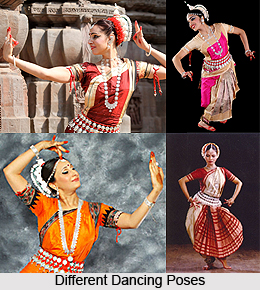 Odissi Music is a very old classical Indian style of music with specific Raagas, Taals, and its own special style of rendering of lyrics and melody. It belongs to the genre of Classical music of India and has its origins in the eastern Indian state of Orissa. Indian Classical Music has five main branches- Avanti, Panchali, Udramagadhi, Hindustani and Carnatic Music. Of these, Udramagadhi exists in the form of Odissi music. Odissi songs traditionally depict the love and frolics of Radha and Lord Krishna. Odissi dance is one of the classical dances of India performed with Odissi music.
Odissi Music is a very old classical Indian style of music with specific Raagas, Taals, and its own special style of rendering of lyrics and melody. It belongs to the genre of Classical music of India and has its origins in the eastern Indian state of Orissa. Indian Classical Music has five main branches- Avanti, Panchali, Udramagadhi, Hindustani and Carnatic Music. Of these, Udramagadhi exists in the form of Odissi music. Odissi songs traditionally depict the love and frolics of Radha and Lord Krishna. Odissi dance is one of the classical dances of India performed with Odissi music.
Origins of Odissi Music
Odissi Music has a rich history and dates back to the 2nd century BC. Originally Odissi was sung to the dance of the `Maharis` (Devadasis) at the Jagannath Temple, and was later sung to dances by young boys, `Gotipuas` performing Odissi dance. The Odissi music of today has evolved from the style of `Gotipua` music. In its earliest days the Odissi style of music and dance was patronised by Kharvela, the ruler of Orissa (Kalinga). The music form got shaped during the time of famous Odiya poet Jayadeva. He was the first one to compose lyrics which were meant to be sung. Later, by the 11th century AD, the folk music of Orissa which existed in the form of Triswari, Chatuhswari, and Panchaswari, came to be adapted into the classical style.
Style of Odissi Music
The presentation style of Odissi music is quite unique in its practicality and other aspects. The major Prabandhas used in the Odissi music system are Odissi, Champu, Chaupadi, Chhanda, Chautisha, Gitagovinda, Janan, Bhajana and Pallavi etc. These Prabandhas are used for stage performance. Swara Malika, Lakshana Geeta etc. are in use especially for giving lesson to students.
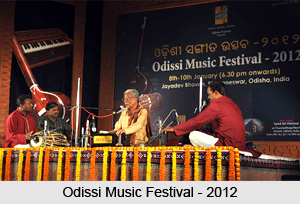 As regards the style of Odissi music it has mainly the following characteristics-
As regards the style of Odissi music it has mainly the following characteristics-
(i) It`s movement is zigzag or Gamak Pradhan.
(ii) It`s nature is neither fast nor very slow, so it`s tempo should be medium.
(iii)The language is medieval Oriya Kavya language.
(iv) It`s compositions are based on Ragas. Out of these Raagas some are original Ragas, some of them share the same name with the mainstream Raagas but Swaras are different. The rest share same Swara with mainstream Raagas but their name is different.
Odissi is sung either with Padi or without Padi. When Odissi is sung with Padi after Sthai Antara, Tala gets prominence and the song is sung at a higher tempo. In such Padiyukta Odissi there is also Jugal Bandi of the singer and the Mardal player.
According to the report of some old practitioners of Odissi music, in ancient times only the compositions were sung but after some time the musicians became aware of various steps followed in mainstream classical systems. Hence they started modifying the original style. In early 50`s the Taan was introduced into Odissi music by the famous vocalist guru Balkrishna Das and the famous violinist Bhubaneswar Mishra. Now-a-days usually the following six steps are followed for stage performance as well as for giving lessons to students: Anibaddha Alap, Prabandha, Nibaddha alap, Padavinyasha, Swara Vinyasha, Taan.
Unless there is some constraint on time, one is expected to follow all these steps while performing. However, it may be noted here that nowadays, some practioners are not doing Nibadha Alaps and Swaravinyas as they feel that excess of Nibadha Alap, Padavinyas and Swaravinyas are destroying the emotive charm of Odissi music. They argue that stress should be given on composition and its variations.
Types of Odissi Music
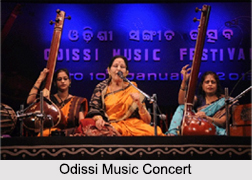 Types of Odissi Music cover a rather large spectrum. The various forms of this classical music style include Champu, Chhanda, Chautisa, Geeta Gobinda, Janan and Bhajan. These different types of Odissi Music are briefly discussed below.
Types of Odissi Music cover a rather large spectrum. The various forms of this classical music style include Champu, Chhanda, Chautisa, Geeta Gobinda, Janan and Bhajan. These different types of Odissi Music are briefly discussed below.
Champu
Kavya with admixture of both prose and poem are known as Champu. In a Champu composition every stanza starts with the same alphabet. This is sung in Raaga and Tala. Instead of Anibadha Alapa there is Rupak Alapa. There is Pada Vinayas, short Swara Uinyas and no Taan.
Chhanda
The main characteristic of these verses is the stress on rhythm. It is set to a definite melody and Raaga. No steps of Raaganga are followed but the traditional technique and colourful Gamaka used here make it a special and very popular style. It is sung in a particular Brutta or Vani. Every Pada of a Chhanda is sung in the same Swara. Singers sing from the Oriya language epics of Mahabharata, Ramayana and from the Indian Puranas.
Chautisa
There are 34 (Chautrisha) Padas in such a composition. Hence it is called Chautisha. Like Chhanda this is based on Brutta or Vani and all the Padas are sung in the same swara. But unlike Chhanda it is always composed with 34 Padas. Every Pada begins with one alphabet of Oriya language and in the 34 Padas 34 alphabets are used in Proper sequence. Among all the Chautisa songs written in Oriya `Manabodha Chautisa` is most popular.
Chaupadi
It consists of four stanzas. This variety of songs is songs of love. The language of the songs is lyrical, simple and direct.
Chaturang
This type of singing is not in popular practice but it comes under the traditional singing style. This type of song is not very old in origin. It consists of four parts, namely, Khayal, Tarana, Saraagam and Tirvat. In the first part, the words of the song are there, the second consists of syllables of Tarana, in the third part a small piece of Sargam is sung in the same Raaga in which Chaturang is sung, and in the last part, the Bols of Mridang or Pakhavaj are recited.
Geeta Gobinda
The Geeta Gobinda is one of the most beautiful works of the performing arts. It is an admixture of song and drama. Through millions of devotees who visited the Jagannath temple from various parts of India, Gitagovindams popularity spread all over India. There are a total of 24 Astapadas and these songs describe the various moods, shades and various episodes of love between Radha and Lord Krishna. They were written in 12th century in Sanskrit language. These verses exude at once spiritualism and eroticism. Oriya music as well as literature bears distinct marks of Jayadeva`s style.
Gita Gobinda, is composed in Gitichhanda. Jayadeva has incorporated the Raaga, Tala etc. in his Prabandhas. He has mentioned the name of Raagas in which the particular Pada should be sung. Nibaddha Alap and short Pada Vinayas are followed but Swara Vinayas and Taan are avoided. These songs are composed on popular Prakrit model but interwoven into Kavya. The musical and poetic potentialities of the compositions of Geeta Gobinda were so rich that they have left indelible mark on the composers of Orissa of the medieval and even of the modern period.
Janana and Bhajan
These are purely devotional songs. In Janana supplication and invocation are made while Bhajan is only in praise of the Lord. In both the types there is only short Nibaddha Alap. There is a difference in Tala in the three systems
Features of Odissi Music
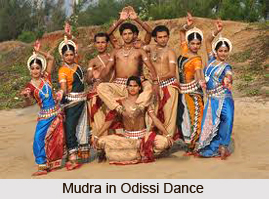 Features of Odissi Music are neither completely Hindustani nor Carnatic. Odissi music has its own unique style of composition and performance which is typical to this classical art form from the eastern state of Orissa. Technically, one can divide the singing style of Odissi into four parts- Natyanga, Raganga, Dhirubapadanga and Bhavanga. These are briefly discussed below.
Features of Odissi Music are neither completely Hindustani nor Carnatic. Odissi music has its own unique style of composition and performance which is typical to this classical art form from the eastern state of Orissa. Technically, one can divide the singing style of Odissi into four parts- Natyanga, Raganga, Dhirubapadanga and Bhavanga. These are briefly discussed below.
Natyanga
These are small compositions. These are sung in Natya (small musical plays) or with dance. Such compositions are used in Gotipua dance. The stress in such compositions is on Tala. Pada Vinyas or Swara Vinyas is very sparsely made. Very short Taan is also sandwiched in between.
Ragang
As in any other classical music system, this is the most important aspect of Odissi also. The minimum rules of Raaga Gayan are: at least five swaras must be there; this must belong to a Janya that; rules regarding Jati, Gayan Time, Vadi, Samvadi etc. must be followed; besides these general rules all the characteristics of the particular Raaga are also to be followed.
The Ragang of Odissi as passes through six stages like all other classical systems. These are discussed below.
(i) Anibaddha Alap: Though some practitioners today determine their Anibadha Alap according to the nature of the Raaga, the majority of the practitioners deride this as blind imitation of mainstream system. The latter compose their Anibadha Alap keeping in view the content, spirit and the tune of the composition, and not merely the Raaga.
(ii) Prabandh: In Odissi mostly compositions from medieval Oriya literature are selected as Prabandha. Some modern compositions following the form and content of medieval lyrics are also used. Just above the composition, Raga and Tala to be followed are mentioned by the poet and the Sthai, called `Ghosa` by the lyricists are also mentioned within the body of the composition. The composition ends with a Vanita, a kind of short colophon in verse form where the name of the poet is mentioned. The singing passes through the three stages of Sthai, Antara and Padi.
(iii) Nibaddha Alap: Odissi music puts stress on Tala. Keeping the Tala in mind and after completing all the stages of Prabandha, the singer returns to Sthai.
(iv) Padavinyas: In Padvainayas stage of Odissi, the words or the Padas to be expounded are chosen keeping in mind the total Bhava. Of course, generally the Sthai part is chosen for the purpose and sometimes the singer even arbitrarily chooses Padas but this should not happen. In Bhava music the singer must be fully aware of the meaning of the Padas and the Bhava expected to be expressed.
(v) Swara Vinyas: Taking into consideration the Bhava, Chhanda and Laya of the Prabandha the Swaravinyas of the Raga is made. The artist gets an opportunity to prove his proficiency in Swara and Tala.
After giving an exposition of the Sthai the performer passes through Nibadha Alap, Padavinyas and Swaravinyas. The same process repeated again after the Antara. But the ideal performer does not give extended demonstration of these parts.
(vi) Taan: In olden days Taan was done intermittently within the Gaayan of the Prabandh. Long or short intricate Taans were sandwiched between the songs. But since the 50`s Taan is made towards the end as is done in Hindustani or Carnatic Music.
Generally, `aakar` taan is made use of in Odissi but many now-a-days also use Saragam. An overdose of taan, which is taken resort to by many modern practitioners, is influenced by the mainstream classical systems.
(vii) Pallavi: Sometimes after all the stages of Ragang are completed Pallavi is sung. Pallavi is sung with the Ukuta of the Mardala in Raaga and Tala. There is Sthai, Pada and Padi. The Ukutas are sung in various lay as basing on the notation of particular Raaga. Intermittently the seven Swaras are sung in Chhanda.
Dhrubapadanga
This style like dhrupad in Hindustani is prevalent in Odissi since a very long time. The themes of the Prabandha are mainly either descriptive, devotional or else in praise of the patron. Bhakti (devotion) gets importance along with Veera (heroic) Rasa. Before the composition proper is taken up Nom, Tom, Alap is made. Following Odissi custom Sargam, Alap is also used. There is Laykari in Prabandh. There is no Nibadh Alap or Taan. Typical Odissi Talas like Matha, Kuduka and Sariman are used.
Bhavanga
There are some Prabandhas in Odissi which demand intense emotional expression and here expression of Bhava becomes primary. Purity of Ragas or accuracy of Tola becomes secondary. The Prabandha is sung in traditional Swara. For better effect various Ragas are also mixed and sung in slow, graceful manner. Sometimes short Nibadha Alap and Pada Vinyas are made. But Swara Vinyas or Taan are avoided.
Raagas in Odissi Music
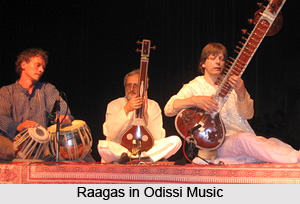 Raagas in Odissi Music can be divided into three major categories. There are some Raagas in Odissi music which are original and unique and are not found in the mainstream classical systems like Hindustani or Carnatic music. There are some other Raagas whose names are not similar but Swaras are similar with those in one or both the mainstream systems. Finally, there are some Raagas whose names are similar with the names of corresponding Raagas in one or both mainstream systems but Swaras are not similar.
Raagas in Odissi Music can be divided into three major categories. There are some Raagas in Odissi music which are original and unique and are not found in the mainstream classical systems like Hindustani or Carnatic music. There are some other Raagas whose names are not similar but Swaras are similar with those in one or both the mainstream systems. Finally, there are some Raagas whose names are similar with the names of corresponding Raagas in one or both mainstream systems but Swaras are not similar.
Original Odissi Raagas
These Raagas are based on Udra tradition following Grama-Murchana theory but now-a-days these are being composed in Mela Padhati. Among the original Odissi Raagas are Raaga Abhiri, Raaga Karnata Abhirika, Raaga Kaushki, Raaga Nagadhyoni and Raaga Dhanyasika or Dhannasi.
Different Raaga name but same Swara
Raaga Sudha Kaushiki is included in this category. Raaga Malkaunsha of Hindustani music and Raaga Hindol of Carnatic music are very similar to this Odissi Raaga and their Swaras. There is no Sudha Kaushiki Raaga in any of the mainstream traditions. Apart from this, Raaga Kokila used in Odissi music is very similar to Hindustani`s Bhupali and Carnatic`s Mohana Raagas for its Swaras. However, the Chalana of Swaras and the Bhava of Raaga are very different from each other. There is no such Raaga by the name of` Kokil` in Hindustani music. In Carnatic music, although some forms with some affix like Kokiladhwani, Kokila pancham, Kokila ganclharva etc. are found simply `Kokila` is not found.
Same Raaga name but different Swaras
Raaga Todi or Soka Baradi is one such Raaga where the name of the Raaga is the same as in other mainstream traditions but the Swara is different. The modulation of Sivaras or intonation of Swaras of this Raaga is different in these three traditions. In Hindustani music, the seven Swaras are used but Rishava, Gandhar, Madhyam and Dhaivat Swaras are Vikrit Swaras. The Vikrit Swaras are same in both Odissi and Carnatic music but in Odissi music all Swaras are used. Another such Raaga is the Raaga Karnata. In this Raaga, the Nishad Swara is Vikrit and rest of the Swaras are Sudha. According to Swara Chalan, this Raaga is similar to Carnatic`s `Ishmanohari` of Harikombaji Mela and `Pahadi Kamodi` Raaga of Hindustan music. In Orissa, this Raaga is sometimes called Kandi, Karnat or Kanada. In Hindustani music, there is no Karnat Raaga but Darahari Kanada or Naiki Kanada etc. are not same as the Odissi Kanada. Odissi Kanada or Karnata is very similar with Hindustani Khamqja Thata`s Swara.
These discussed are therefore the major types of Raagas in Odissi Music. It may be mentioned here that among the original Raagas of Odissi Music which are still in use are Chandrakanta, Mohan Kalyan, Sudha Barata , Bakula Bharana, Soka baradi, Desha baradi, Ramkriya, Kalinga Gaud Gauri, Baradi todi, Bilahari, Deshakya, Dhanasri, Malvagauda, Kedargauda, Saberi, Mukhari, Chinta Kedar, Kedar Kamodi, Marga Bihag, Kalavati, Ahari, Malva, Bhopal (re, ga, dha swaras komal), Pattamanjari, Chakrabak (Ahir bhairava of Hindustani music), Slinghru madhyam, Sudha saberi, Malashri, Gauda, Kusum Kedar, Belabali, Shriranjani, Araui and Kambardhani.
Musical Instruments used in Odissi Music
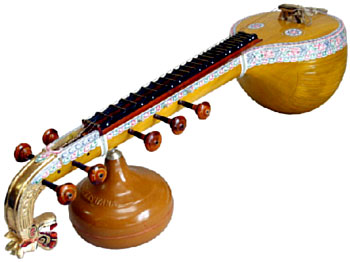 Musical instruments used in Odissi Music are few in number. Some of the basic instruments which have been used in Odissi Music are the Ravan Hashta, the Harmonium, and the Veena or Sitar. Nowadays, a number of instruments are being replaced, like the Violin is being used instead of the Ravan Hashta. The Tanpura (a string instrument) is used by all the three streams of mainstream classical music- Odissi, Hindustani as well as Carnatic music. But one instrument which stands out among all as typical and irreplaceable both in case of Odissi dance and Odissi music is the Mardala. Further details of this typically Odissi instrument are given below.
Musical instruments used in Odissi Music are few in number. Some of the basic instruments which have been used in Odissi Music are the Ravan Hashta, the Harmonium, and the Veena or Sitar. Nowadays, a number of instruments are being replaced, like the Violin is being used instead of the Ravan Hashta. The Tanpura (a string instrument) is used by all the three streams of mainstream classical music- Odissi, Hindustani as well as Carnatic music. But one instrument which stands out among all as typical and irreplaceable both in case of Odissi dance and Odissi music is the Mardala. Further details of this typically Odissi instrument are given below.
In Odissi Sangeet Sastras it is mentioned that among all the skin percussions Mardala is the best. Its description is found in Charyagiti and various Sastras and Kavyas of medieval Orissa. In all Orissan temples also one finds the sculpture of Mardala players. Mardalavadini (the woman Mardala player) of Konark is famous. It is played during various Sevas (services) of Lord Jagannath. It is played as an accompaniment both in Mahari dance as well as Gotipua dance.
Odissi mardala more or less resembles Pakhavaj but there is also a difference both in terms of construction and technique. The Mardala which is originally used in the Jagannath Temple is simple in construction and there is no mechanism in it to adjust the pitch. Simhari Shyamsundar Kar added `Gotakas` to this simple Mardala so that it can be tuned as per need. In Pakhavaj, for example on the left side a layer of flour is given while in Mardala there is Kiran. 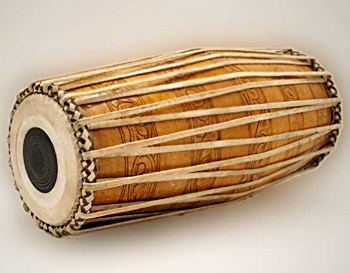 As regards to practice and technique the Vaani or Ukuta, Khandi, Gadi Arassa in Mardala are different from those in Pakhavaj. Especially, the Chanti and movement of fingers are quite different in Mardala.
As regards to practice and technique the Vaani or Ukuta, Khandi, Gadi Arassa in Mardala are different from those in Pakhavaj. Especially, the Chanti and movement of fingers are quite different in Mardala.
Till now Mardala is played mostly as an accompaniment of Odissi dance. Solo Mardala playing has not yet been very popular as stage performance. Gurus like Mahadev Rout, Chakradhar Sahoo, Harmohan Khuntia, Banmali Maharana, Dhaneswar Swain and Sachidananda Das are trying to make solo playing, dual playing and Jugalbandi of Mardala popular. The famous Odissi dance Guru Kelucharan Mohapatra and Odissi music Guru Simhari Shyam Sunder were also famous as Mardala players.
Tala System in Odissi Music
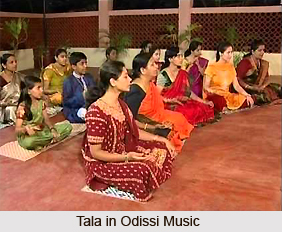 Tala system in Odissi music follows the Talas laid down by Bharata. According to Bharata muni the talas in which a Suda Gana should be sung are - Aadi, Yati, Nisaru, Adda tala, Triputa, Rupaka, Jhampaka or Jhampa, Mantha and Ektal. These are the Talas used in Orissa. They are mentioned in Geeta Prakash of Krushna Das and Sangeet Muktavali by Harichandra. These are the Talas which have been in use in Odissi music from ancient times and continue to be so. Apart from the above mentioned there are also a number of Prachilit Talas which are used in Odissi Music. These include- Aditala, Jatitala, Nisharu, Adatali, Triputa, Rupak, Jhampa, Matha, Ektala, Athatali, Kuduk, Sariman, Pahapata, Jhula, Gaja Jhampa, Khemta, Kaharba, Tetola (Tritala), Chautala and Dhamara.
Tala system in Odissi music follows the Talas laid down by Bharata. According to Bharata muni the talas in which a Suda Gana should be sung are - Aadi, Yati, Nisaru, Adda tala, Triputa, Rupaka, Jhampaka or Jhampa, Mantha and Ektal. These are the Talas used in Orissa. They are mentioned in Geeta Prakash of Krushna Das and Sangeet Muktavali by Harichandra. These are the Talas which have been in use in Odissi music from ancient times and continue to be so. Apart from the above mentioned there are also a number of Prachilit Talas which are used in Odissi Music. These include- Aditala, Jatitala, Nisharu, Adatali, Triputa, Rupak, Jhampa, Matha, Ektala, Athatali, Kuduk, Sariman, Pahapata, Jhula, Gaja Jhampa, Khemta, Kaharba, Tetola (Tritala), Chautala and Dhamara.
In the Badya Adhyaya (Chapter on instruments) of Sangeeta Ratnakar in sloka 848 to 894 Sarangadev has described the Hasta-Pata Lakshanas (the characteristics of hands and fingers movement).For example:
Tan - gini, gidi, dagi, kita, tata, khir, ta tho, dhi, -jhen, Nag - taki - dhi ki -thaniki, khe - dhi dhi gira. dran dnan Khu khud - kit tho, kita jhe, thargida takit - raha - thogiu - dhi kit etc.
This Badyaskhara system has been followed by important Sastras of Orissa like Geeta Prakash, Sangeeta Narayan, Sangeeta Muktabali etc.
Many treatises have been written on Talas and they describe its various aspects. One of the most important among these treatises is the `Tala Sarbasara Sangraha.` It was written by Shri Padmanava Narayan Deva in 1896 A.D. The writer mentions that at the time of Lord Shiva`s Tandava Nritiya seven Talas, namely, Dhruva Tala, Matha, Rupak, Jhampa, Triputa, Adatali, Aktali arose. In this text, there is description of ten Pranas of Tala, six Jatis, seven Talas, Laya, Anga etc. It also discusses the history of the origin of Tala. He has given the names and characteristics of 110 Talas, which are based on Sastras.
Some of the original Talas used in Odissi music include Kuduk, Triputa and Sariman Talas. The Kuduk is mainly used in the Dhrubpad style of singing. So this tala is called dhruba padanga tala. The Triputa consists of 14 matras. It is very similar to 95th tala, "Antarkritala" of `Sangeet Ratnakar`. The Sariman Tala is very old and is a traditional Tala of Odissi music.
Gamakas in Odissi Music
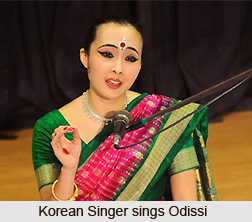 Gamakas in Odissi Music are certain very important elements in the presentation of the musical style. Gamaka actually means the shaking or vibrating of a tone which sounds delightful to listen to. In a melodic structure, the formulation of a tonal shade arising out of a Swara`s own Sruti and resorting to that of another Sruti, is demonstrated to be the Gamaka. According to the Sangeet Ratnakar, the different varieties of Gamaka are: Tiripa, Sphurita, Kamrita, Lina, Andolita, Vali, Tribhinna, Kurula, Ahata, Uttasita, Plavita, Humphita, Mudrita, Narnita, and Misria. After Ratnakar, Pundit Anobal of Sangit Parijat has mentioned twenty types of Gamakas. Bharata, the author of the Natyashastra, does not distinguish between Alamkara and Gamaka.
Gamakas in Odissi Music are certain very important elements in the presentation of the musical style. Gamaka actually means the shaking or vibrating of a tone which sounds delightful to listen to. In a melodic structure, the formulation of a tonal shade arising out of a Swara`s own Sruti and resorting to that of another Sruti, is demonstrated to be the Gamaka. According to the Sangeet Ratnakar, the different varieties of Gamaka are: Tiripa, Sphurita, Kamrita, Lina, Andolita, Vali, Tribhinna, Kurula, Ahata, Uttasita, Plavita, Humphita, Mudrita, Narnita, and Misria. After Ratnakar, Pundit Anobal of Sangit Parijat has mentioned twenty types of Gamakas. Bharata, the author of the Natyashastra, does not distinguish between Alamkara and Gamaka.
The Gamakas can be classified according to duration, range of notes, and special effect created. In Odissi music, mainly four Gamakas are in use, namely, Andolita, Ahata, Dhalu (ascending Dhalu and descending Dhalu) and Ambredita. The nature of speed of Odissi music is Andolita. This Andolita Gamaka is a classical Gamaka system. In this process, the Swara is not stable but vibrating. Andolita Gamak manifests its beauty with the help of Ahata Gamak. The most essential characteristics of Ahata gamak is to sing a particular Swara with the touch of its next ascending note. Another gamak is dhalu, which is used in ascending and descending process. This Gamak is mainly used in the recitation of Odissi Raaga music. Ambredita Gamak is a traditional and special Gamaka of Odissi. This Gamaka is used very frequently. It finishes its cycle with one matra and is always descending in nature. It is in fast pace. The four major Gamakas are defined below:
Andolita - sa re ga ma
Ahata - sa re ga ma
Arohi dhalu - mapapaninisa
Abarohi dhalu - sani nidha dhapa ..
Ambredita - nisaniresani, gamagapamaga,
regaremagare, padhapasanidhapa
Sastras in Odissi Music
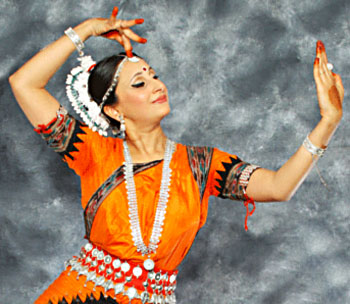 Sastras in Odissi Music refer to the various musical treatises from which the classical music style has drawn inspiration. Sastras are the written musical traditions which are preserved in musical notation as opposed to oral transmissions. The written work contains the technical instructions for performing the work. Odissi dance followed the universally accepted Sastras like Natyashastra and Abhinay Darpana Prakash while gaining its special identity by following regional Sastras like Abhinaya Chandrika and Natyamanorama etc. Odissi Music has followed much the same path as Odissi dance in its formulation and development.
Sastras in Odissi Music refer to the various musical treatises from which the classical music style has drawn inspiration. Sastras are the written musical traditions which are preserved in musical notation as opposed to oral transmissions. The written work contains the technical instructions for performing the work. Odissi dance followed the universally accepted Sastras like Natyashastra and Abhinay Darpana Prakash while gaining its special identity by following regional Sastras like Abhinaya Chandrika and Natyamanorama etc. Odissi Music has followed much the same path as Odissi dance in its formulation and development.
The musical philosophy of Natyasastra and Sangeet Ratnakar has been followed in Odissi music. At the same time, Odissi music has taken its special features from regional Sastras like Geeta Prakash and Sangeeta Narayan. Raaga Vasant can be taken as an illustration. According to Sangeet Ratnakar (Raaga Vibekadhyay, Part II, slokas 93,94, 95) this Raaga is created from five Swaras of Raaga Hindol. If Hindol Raaga is composed with seven Swaras then it is transformed into Vasanta Raaga. These two are included in Dhaivati and Arsavi Jati. But Vasanta Raaga is described differently in Odissi Sastra `Sangeet Narayan` as follows:
According to Sangeet Narayan, Raaga Vasant originated from Sadajmadhyamik Jati and is included in maschharikrita murchhana. If the swara of this murchhana is presented in Hindustani style then it turns more or less into Khamaj thhat.
This proves that though Odissi music is broadly based on Sastras from which mainstream Sastriya music also draws its rules, it also takes the help of some regional Sastras to create its special regional identity. Sometimes a Raaga`s character has been expounded almost in the same manner in both universal as well as regional treatises. Raaga Shree can be taken as an example.
According to Sangeet Ratrakar of Sarngadeva (13th century), the Odissi Sastra `Geeta Prakash` by Krishnadas Bada Jena Mahapatra (16th century) and the `Sangeet Narayan` (17th century) the characteristics of Shree raaga are as follows:
i) Jati: Sadaja;
ii) Pancham swara used very sparsely;
iii) Raaga belongs to Sadaj Gram;
iv) Raaga is suitable to express Sringara as well as Veera Rasa according to Sangeet Narayan while Sangeet Ratrakar mentions only Veera Rasa and Geeta Prakash makes no mention;
v) One important difference is while according to Sangeet Ratrakar Gandhar is the Graham, Ansa and Mandra Swara, Odissi Sastras, Geeta Prakash and Sangeet Narayan Nyasa and Graham Swaras are Sadaj.
Melas of Odissi Music
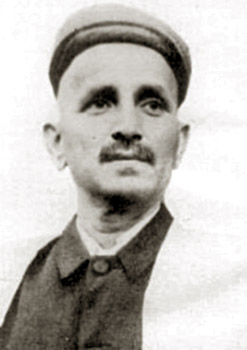 Melas of Odissi music form a very important part of the musical structure. That which has the capacity to build a Raaga is called Mela or Thhat. Incidentally usually `Mela` is used in Carnatic and `Thhat` in Hindustani. It consists of seven Swaras. The number of Melas is different in each system. V. N. Bhatkhande put all the Raagas into ten Melas. Odissi music usually follows the ten-mela formula. But according to some musicologists, there should be 32 Melas in Odissi music as all Raagas of Odissi music can not come under the ten-mela formula.
Melas of Odissi music form a very important part of the musical structure. That which has the capacity to build a Raaga is called Mela or Thhat. Incidentally usually `Mela` is used in Carnatic and `Thhat` in Hindustani. It consists of seven Swaras. The number of Melas is different in each system. V. N. Bhatkhande put all the Raagas into ten Melas. Odissi music usually follows the ten-mela formula. But according to some musicologists, there should be 32 Melas in Odissi music as all Raagas of Odissi music can not come under the ten-mela formula.
32 Melas according to Guru Lokanath Pala
He divides Raagas into two parts. He places 16 Raagas under Sudha Madhyam category and another 16 Raagas under Tivra Vikrit Madhyam, category. He has taken the name and swara of these 32 Melas from among the 72 Melas of Carnatic music mentioned in Raaga Laxyanam Sastra. The Raagas in the Sudha Madhyam category are Shankara bharana - sa re ga ma pa dha ni (all sudha); Suriya Kanta - Sa re, ga ma pa dhani (re Komal), Gauri manohari - Sa re ga ma pa dha ni (ga Komal), Sarsangi - Sa re ga ma pa dhci ni (dha Komal), Kamodi - Sa re ga ma pa dha ni ( ni Komal), Tana rupi - Sa re ga ma pa dha ni (re, ga Komal), Rag bardhani - Sa re ga m,a pa dha ni (dha and ni Komal), Malva gauda - Sa re ga m,a Pa dha ni (re and dha Komal), Chakrabak - Sa re ga ma Pa, dha ni (re and ni Komal), Kirbani - Sa re ga ma Pa dha ni (ga and dha Komal), Har Priya - Sa re ga ma pa dha ni (ga and ni Komal), Dhenuka - Sa re ga ma. pa dha ni (re, ga and dha Komal), Nat Bhairavi - Sa re ga ma pa dha ni (ga, dha and ni Komal), Bakula Bharan - Sa re ga ma pa dim, ni (re, dha and ni Komal), Natak Priya - Sa re ga ma pa dim ni (re, ga and ni Komal) and Bhairavi - Sa re ga ma pa, dha ni (re, ga dha and ni Komal).
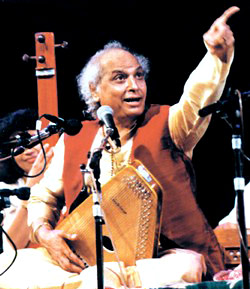 Among the Raagas ion the Tivra Madhyam Category are Kalyani - Sa re ga ma pa dha ni (ma swara tivra), Gamanashrama - Sa re ga ma Pa dha ni (re, komal and ma tibra), Nitimati - Sa re ga ma Pa dha ni (ga komai and ma tivra), Dhatubardhani - Sa re ga m,a pa dha ni (ma tibra and dha komal), Bachaspati - Sa re ga ma pa dha ni (ma tivra and ni komal), Pabani- Sa re ga ma pa dha ni (re, ga komal and ma tivra), Jyotiswarupini - Sa re ga ma pa dim ni (ma tivra and dha and ni komai), Baradi - Sa re ga ma pa dha ni (re, dha komal and ma tivra), Rasa Priya-Sa re gam,a pa dhani (re, ni komal and ma tivra), Hemabati - Sa re ga ma pa dha ni (ga and ni komal and ma tivra), Todi -Sa re ga mapa dha ni (re, ga dha komal and ma tivra), Shyamcdangi - Sa re ga ma pa dha ni (ga dha ni komal and ma tivra), Dhahalambari -Sa re ga ma pa dha ni (re, dha, ni komal and ma tivra), Nabanita- Sa re ga ma pa dha ni (re, ga, ni komal and ma tivra), Gabambodhi -Sa re ga ma pa dha ni (re, ga, dha and ni komal and ma tivra)
Among the Raagas ion the Tivra Madhyam Category are Kalyani - Sa re ga ma pa dha ni (ma swara tivra), Gamanashrama - Sa re ga ma Pa dha ni (re, komal and ma tibra), Nitimati - Sa re ga ma Pa dha ni (ga komai and ma tivra), Dhatubardhani - Sa re ga m,a pa dha ni (ma tibra and dha komal), Bachaspati - Sa re ga ma pa dha ni (ma tivra and ni komal), Pabani- Sa re ga ma pa dha ni (re, ga komal and ma tivra), Jyotiswarupini - Sa re ga ma pa dim ni (ma tivra and dha and ni komai), Baradi - Sa re ga ma pa dha ni (re, dha komal and ma tivra), Rasa Priya-Sa re gam,a pa dhani (re, ni komal and ma tivra), Hemabati - Sa re ga ma pa dha ni (ga and ni komal and ma tivra), Todi -Sa re ga mapa dha ni (re, ga dha komal and ma tivra), Shyamcdangi - Sa re ga ma pa dha ni (ga dha ni komal and ma tivra), Dhahalambari -Sa re ga ma pa dha ni (re, dha, ni komal and ma tivra), Nabanita- Sa re ga ma pa dha ni (re, ga, ni komal and ma tivra), Gabambodhi -Sa re ga ma pa dha ni (re, ga, dha and ni komal and ma tivra)
36 Melas according to Guru Gopalchandra Panda
Guru Gopalchandra Panda suggests that by accepting 36 Melas alone the distinct identity of Odissi can be preserved. According to him Sudha Madhyam category will include eighteen Raagas and Tibra Madhyam will include another eighteen Raagas. Sri Panda suggests that to make it easier for the learners the following 4 Melas can be added to the 10 Prevalent Melas given above. The four Melas he suggests are: Nata Narayana, Anand Bhairabi, Melaparnee and Pancham Baradi. Thus for operational purpose he limits the number of Melas to 14.
Though 32 Melas have been conceived in Hindustani and 72 in Carnatic, for all practical purposes, they manage with 10 Melas and 19 Melas respectively. Unlike Carnatic Hindustani resembles Odissi in its Swara Samsthan. So the generic principles of Odissi Melas can be same as Hindustani. Many of the contemporary Hindustani maestros like Pandit Ravisankar, Pandit Jasraj, Ustad Amajad Ali Khan etc. have innovated new Raagas. But all these new Raagas are being adjusted within those ten Melas.
Major Works of Odissi Music
The major works in the Odissi style are - `Geeta Prakash` by Krushnadas Badajena Mohapatra, `Sangeeta Muktavali` by Sri Harichandana and `Sangeeta Narayana` by Pandit Purusottama. These works establish the basic fundamentals of the Odissi style of music. Apart from these major works, there are a number of other works that deal with the Odissi style in detail. These include Panchanama Sarasamhita, Sangeeta Ratnamala, Sangeeta Kalpalatika, Raagabije, Jagamohana, Chhanda etc.
Some renowned Odissi lyricists are Jayadev, Kavisamrat Upendra Bhanja, Deenkrushna, Kavisurya Baladev Ratha, Gopalkrushna, Banamali etc.




















